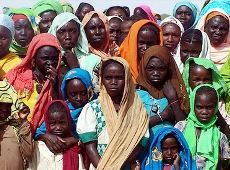Darfuris find refuge with ex-rebels
Oct 1, 2006 (KAUDA) — “It took me four months to get here,” said Abbaker Musa who fled the war-torn region of Darfur, still plagued by violence despite a May peace deal that ended three years of conflict.
 Abbaker is one of more than 1,000 Darfuris, half of whom are children, who found refuge in a camp for internally displaced people (IDPs) in central Sudan’s South Kordofan state, after fleeing Darfur in the west.
Abbaker is one of more than 1,000 Darfuris, half of whom are children, who found refuge in a camp for internally displaced people (IDPs) in central Sudan’s South Kordofan state, after fleeing Darfur in the west.
A peace deal signed in May this year between Khartoum and the main faction of the rebel Sudan Liberation Movement (SLM) did not stop the violence, forcing Abbaker and many others to flee the arid desert region.
Abbaker started his 1,000-kilometre (620-mile) journey on a donkey, which he was forced to sell along the way to buy food.
“Sometimes I found a kind person to give me a lift on his way while he was driving,” he said.
He eventually ended up in a camp in Kauda, central Sudan, a stronghold of the former rebel Sudan People’s Liberation Movement (SPLM) which signed another peace deal with the government in January 2005 to end a decades-long war between north and south.
“This IDP camp has been established since last May when the first group of persons fleeing the fighting they reported was still going on in Darfur,” said Adam Tiyah, a SPLM official in charge of humanitarian affairs.
During his journey, Abbaker was told that in South Kordofan, free food was being offered to the displaced.
“We were also told that there is a lot of food in the areas held by the SPLM and for this reason we came to Kauda,” said Abbaker, who is unaware of the fate of his parents or siblings.
“We escaped in different directions fleeing from the Arab Janjaweed,” he said.
Decades of ethnic tensions in Darfur erupted into all-out violence in 2003 when ethnic minorities took up arms against the Arab-dominated government in Khartoum to fight for autonomy and a greater share of the region’s resources.
The government responded by unleashing its mainly Arab proxy militia, the Janjaweed, in a scorched-earth policy against minority villages suspected of supporting the rebels.
The May peace agreement requires the government to disarm the Janjaweed, accused of raping and murdering civilians in the vast desert region.
Ahmed Adam, his wife and their son arrived at the Kauda camp two months ago after a “very long and difficult journey running away from the Janjaweed.”
“I could not stay in Darfur to see my mother or my sister raped in front of my eyes,” he said.
Responding to the influx of Darfuris, the United Nations Children’s Fund (UNICEF) set up the camp near Kauda and was offered assistance by other UN agencies including the World Food Program (WFP) and World Health Organisation (WHO).
Huts made of canvas were erected and a makeshift school was set up.
“When we saw yound IDPs using cardboard and coal to teach the children, we decided to make school rooms,” said Najwa Musa, UNICEF’s repress
(AFP/ST)
